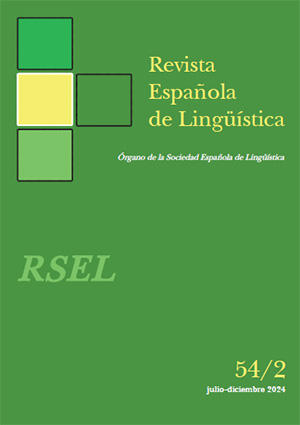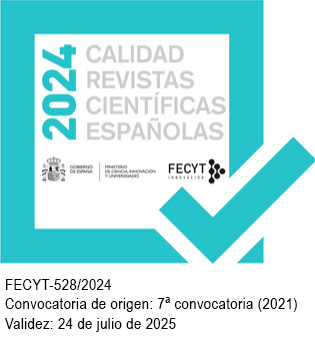Sobre superlativos y cantidades «mínimas»
Palabras clave:
Superlativas; cuantificación; grado; escalas; modalidadResumen
En este artículo se ofrece una descripción exhaustiva de las propiedades gramaticales y semánticas de las superlativas de cantidad mínima, esto es, expresiones superlativas, generalmente formadas con el superlativo léxico mínimo, que denotan una cantidad o un grado mínimos. Además de su significado cuantitativo, estas construcciones poseen un valor modal que distingue dos clases: aquellas formadas con un complemento restrictor de modalidad teleológica (las condiciones mínimas necesarias) y aquellas en las que el complemento restrictor es un modal dinámico de posibilidad (los mínimos errores posibles). A partir de las diferencias sintácticas y semánticas entre ambos tipos de superlativas, proponemos un análisis distinto para cada una: mientras que el mínimo teleológico es un modificador restrictivo, el mínimo dinámico es un auténtico cuantificador.
Descargas
Citas
Bogal-Allbritten, E. (2012). Slightly coerced: processing evidence for adjectival coercion by minimizers. En Proceedings of the 48th Annual Meeting of the Chicago Linguistic Society (pp. 77-92). Chicago: Chicago University Press.
Bolinger, D. (1972). Degree words. La Haya: Mouton. doi: https://doi.org/10.1515/9783110877786
Bosque, I. (1996). On specificity and adjective position. En J. Gutiérrez-Rexach y L. Silva (eds.), Perspectives on Spanish linguistics (pp. 1-14), Los Ángeles: Department of Linguistics, UCLA.
Champollion, L. (2017). Parts of a whole. Distributivity as a bridge between aspect and measurement. Cambridge: Cambridge University Press.
Chierchia, G. (1998). Plurality of mass nouns and the notion of semantic parameter. En S. Rothstein (ed.). Events and grammar (pp. 53-103). Ámsterdam: Kluwer Academic Publisher. doi: https://doi.org/10.1007/978-94-011-3969-4
Chierchia, G. (2010). Mass nouns, vagueness and semantic variation. Synthese, 174, 99-149. doi: https://doi.org/10.1007/s11229-009-9686-6
Cinque, G. (2010). The syntax of adjectives. Cambridge: The MIT Press.
Constantinescu, C. (2011). Gradability in the nominal domain. Tesis doctoral, Universidad de Leiden.
Delgado, U. (2024). Superlative minimizers as weak definites. A study on Spanish. Isogloss, 10(3), 1-23. doi: https://doi.org/10.5565/rev/isogloss.347
Delgado, U. (2023). Los minimizadores superlativos en español. Fenómenos de grado, definitud y polaridad. Tesis doctoral, Universidad Complutense de Madrid.
Delgado, U. (2020). Scalar properties of negative polarity superlatives. Borealis, 9(1), 1-33. doi: https://doi.org/10.7557/1.9.1.5358
Enç, M. (1991). The semantics of specificity. Linguistic Inquiry, 22(1), 1-25.
Fábregas, A. (2016). Las nominalizaciones. Madrid: Cátedra.
Fábregas, A. (2017). The syntax and semantics of nominal modifiers in Spanish: interpretations, types and ordering facts. Borealis, 6(2), 1-102. doi: https://doi.org/10.7557/1.6.2.4191
Fintel, K. von y Iatridou, S. (2007). Anatomy of a modal construction. Linguistic Inquiry, 38(3), 445-483. doi: https://doi.org/10.1162/ling.2007.38.3.445
Francez, I. y Koontz-Garboden, A. (2015). Semantic variation and the grammar of property concepts. Language, 91(3), 533-563. doi: https://doi.org/10.1353/lan.2015.0047
Francez, I. y Koontz-Garboden, A. (2017). Semantics and morphosyntactic variation: qualities and the grammar of property concepts. Óxford: Oxford University Press.
Gutiérrez-Rexach, J. (2003). La semántica de los indefinidos. Madrid: Cátedra.
González Rodríguez, R. (2010). Alternativas e inferencias escalares: las construcciones del tipo como mucho. Dicenda, 28, 73-97.
Gutiérrez-Rexach, J. (2006). Superlative quantifiers and the dynamics of context dependence. En K. von Heusinger y K. Turner (eds.). Where semantics meets pragmatics (pp. 237-266). Ámsterdam: Elsevier. doi: https://doi.org/10.1163/9780080462608_015
Gutiérrez-Rexach, J. (2010). Characterizing superlative quantifiers. En H. P. Cabredo y O. Matushansky (eds.). Adjectives: formal analyses in syntax and semantics (pp. 187-231). Ámsterdam/Filadelfia: John Benjamins. doi: https://doi.org/10.1075/la.153.06gut
Gutiérrez-Rexach, J. (2014). Superlatives, degrees, and focus. En J. Gutiérrez-Rexach (ed.). Interfaces and domains of quantification (pp. 170-189). Columbus: The Ohio State University Press.
Gumiel Molina, S., Moreno Quibén, N. y Pérez Jiménez, I. (2020). On degree minimizers in Spanish. Borealis, 9(1), 69-86. doi: https://doi.org/10.7557/1.9.1.5367
Hackl, M. (2009). On the grammar and processing of proportional quantifiers: most versus more than half. Natural Language Semantics, 17, 63-98. doi: https://doi.org/10.1007/s11050-008-9039-x
Hacquard, V. (2005). Aspects of too and enough constructions. En E. Georgala y J. Howell (eds.), Proceedings of SALT XV (pp. 80-97), Ithaca: Cornell University. doi: https://doi.org/10.3765/salt.v15i0.2919
Heim, I. (1999). Notes on superlatives. Ms.
Kayne, R. S. (2007). On the syntax of quantity in English. En J. Bayer, T. Bhattacharya y M. T. Hany Babu (eds.), Linguistic theory and south Asian languages. Essays in honour of K. A. Jayaseelan (pp. 73-105), Ámsterdam/Filadelfia: John Benjamins. doi: https://doi.org/10.1075/la.102.09kay
Kennedy, Ch. (2007). Vagueness and grammar: the semantics of relative and absolute gradable adjectives, Linguistics and Philosophy, 30, 1-45. doi: https://doi.org/10.1007/s10988-006-9008-0
Kennedy, Ch. (2015). A «de-Fregean» semantics (and neo-Gricean pragmatics) for modified and unmodified numerals. Semantics & Pragmatics, 8, 1-44. doi: https://doi.org/10.3765/sp.8.10
Krifka, M. (1999). At least some determiners aren’t determiners. En K. Turner (ed.), The semantics/pragmatics interface from different points of view, vol. 1 (pp. 257-291), Ámsterdam: Elsevier.
Landman, F. (2011). Count nouns - mass nouns, neat nouns - mess nouns. Baltic International Yearbook of Cognition, Logic and Communication, 6, 1-67. doi: https://doi.org/10.4148/biyclc.v6i0.1579
Larson, R. (2000). ACD in AP? Conferencia en el 19th West Coast Conference on Formal Linguistics. Los Ángeles (EE. UU.), 4-6 de febrero de 2000.
Loccioni, N. (2018). Getting «the most» out of Romance. Tesis doctoral, Universidad de California, Los Ángeles.
Loccioni, N. (2019). The Romance of modal superlatives as degree descriptions. En K. Blake, F. Davis, K. Lamp y J. Rhyne (eds.). Proceedings of SALT, 29, 219-237. doi: https://doi.org/10.3765/salt.v29i0.4609
McNally, L. (2011). The relative role of property type and scale structure in explaining the behavior of gradable adjectives. En R. Nouwen, R. van Rooij, U. Sauerland y H. C. Schmitz (eds.). Vagueness in communication (pp. 151-168). Berlín: Springer. doi: https://doi.org/10.1007/978-3-642-18446-8_9
Milsark, G. (1974). Existential sentences in English. Tesis doctoral, MIT.
Milsark, G. (1977). Toward an explanation of certain peculiarities of the existential construction in English. Linguistic Analysis, 3, 1-29.
Morzycki, M. (2012). Adjectival extremeness: degree modification and contextually restricted scales. Natural Language & Linguistic Theory, 30, 567-609. doi: https://doi.org/10.1007/s11049-011-9162-0
Muromatsu, K. (2001). Adjective ordering as the reflection of a hierarchy in the noun system: a study from the perspective of numeral classifiers. Linguistic Variation Yearbook, 1, 181-207. doi: https://doi.org/10.1075/livy.1.08mur
Nouwen, R. (2010). Two kinds of modified numerals. Semantics & Pragmatics, 3, 1-41. doi: http://dx.doi.org/10.3765/sp.3.3
Real Academia Española y Asociación de Academias de la Lengua Española (2009). Nueva gramática de la lengua española, vol. 2. Madrid: Espasa.
Romero, M. (2013). Modal superlatives: a compositional analysis. Natural Language Semantics, 21(1), 79-110. doi: https://doi.org/10.1007/s11050-012-9090-5
Rotstein, C. y Winter, Y. (2004). Total adjectives vs. partial adjectives: scale structure and higher-order modifiers. Natural Language Semantics, 12, 259-288. doi: https://doi.org/10.1023/B:NALS.0000034517.56898.9a
Sáez, L. (1999). Los cuantificadores: las construcciones comparativas y superlativas. En I. Bosque y V. Demonte (eds.). Gramática descriptiva de la lengua española, vol. 1 (pp. 1129-1188). Madrid: Espasa Calpe.
Sáez, L. (2016). Comparativos y superlativos. En J. Gutiérrez-Rexach (ed.). Enciclopedia de lingüística hispánica (pp. 437-445). Londres / Nueva York: Routledge.
Sánchez López, C. (2017). Maneras poco usuales de contar mayorías. En Á. Gallego, Y. Rodríguez Sellés, J. Fernández-Sánchez, X. Villalba, J. Uriagereka y C. Sánchez López (eds.). Relaciones sintácticas. Homenaje a José M. Brucart y M. Lluïsa Hernanz (pp. 649662). Bellaterra: Universitat Autònoma de Barcelona.
Sánchez Masià, M. (2017). Adverbial adjectives and nominal scalarity. Tesis doctoral, Universitat Autònoma de Barcelona.
Sassoon, G. W. (2011). A slightly modified economy principle: Stable properties have non-stable standards. En E. Cohen (ed.). Proceedings of IATL 27 (pp. 163-182). Cambridge: MIT.
Sassoon, G. W. y Toledo, A. (2011). Absolute and relative adjectives and their comparison classes. Ms.
Schwarz, B. (2005). Modal superlatives. En E. Georgala y J. Howell (eds.). Proceedings of SALT 15 (pp. 187204). Ithaca: Cornell University. doi: https://doi.org/10.3765/salt.v15i0.3094
Solt, S. (2009). The semantics of adjectives of quantity. Tesis doctoral, Universidad Municipal de Nueva York.
Solt, S. (2011). How many most’s? En I. Reich, E. Horch y D. Pauly (eds.). Proceedings of Sinn & Bedeutung, 15, 1-15.
Solt, S. (2012). Comparison to arbitrary standards. En A. Aguilar-Guevara, A. Chernilovskaya y R. Nouwen (eds.). Proceedings of Sinn & Bedeutung, 16(2), 557-570.
Svenonius, P. (2008). The position of adjectives and other phrasal modifiers in the decomposition of DP. En L. McNally y C. Kennedy (eds.). Adjectives and adverbs: syntax, semantics, and discourse (pp. 16-42). Nueva York: Oxford University Press. doi: https://doi.org/10.1093/oso/9780199211616.003.0002
Szabolcsi, A. (1986). Comparative superlatives. MIT Working Papers in Linguistics, 8, 245-266.
Toledo, A. y Sassoon, G. W. (2011). Absolute vs. relative adjectives – variance within vs. between individuals. En N. Ashton, A. Chereches y D. Lutz (eds.). Proceedings of SALT 21 (pp. 135154). Ithaca: Linguistics Society of America. doi: https://doi.org/10.3765/salt.v21i0.2587
Tovena, L. (2001). Between mass and count. En K. Megerdoomian y L. A. Bar-el (eds.). Proceedings of the 20th West Coast Conference on Formal Linguistics (WCCFL) (pp. 565-578). Somerville: Cascadilla Press.
Tovena, L. (2003). Determiners and weakly discretised domains. En J. Quer, J. Schroten, M. Scorretti, P. Sleeman y E. Verheugd-Daatzelaar (eds.). Romance languages and linguistic theory 2001 (pp. 331-346). Ámsterdam/Filadelfia: John Benjamins. doi: https://doi.org/10.1075/cilt.245.20tov
Tubau, S. (2016). On the syntax of English minimizers. Natural Language & Linguistic Theory, 34, 739-760. doi: https://doi.org/10.1007/s11049-015-9308-6
Tubau, S. (2020). Minimizers and maximizers as different types of polarity items. En V. Déprez y M. T. Espinal (eds.). The Oxford handbook of negation (pp. 407-425). Óxford: Oxford Academic. doi: https://doi.org/10.1093/oxfordhb/9780198830528.013.24
Vallduví, E. (1994). Polarity items, n-words and minimizers in Catalan and Spanish. Probus, 6(2-3), 263-294. doi: https://doi.org/10.1515/prbs.1994.6.2-3.263
Wellwood, A. (2019). The meaning of more. Óxford: Oxford University Press.
Wilson, E. C. (2018). Amount superlatives and measure phrases. Tesis doctoral, The City University of New York.
Wilson, C. E. (2021). The most, the fewest and the least: On the relative readings of quantity superlatives. Semantics & Pragmatics, 14, 1-51. doi: https://doi.org/10.3765/sp.14.9
Zato, Z. (2020a). Encoding states is not enough: the case of Spanish deadjectival nominalizations. Studia Linguistica, 74(3), 665-693. doi: https://doi.org/10.1111/stul.12139
Zato, Z. (2020b). The role of state-kinds in the morphosemantics of Spanish deadjectival nominalizations. Tesis doctoral, Universidad del País Vasco.
Publicado
Cómo citar
Número
Sección
Derechos de autor 2024 Revista Española de Lingüística

Esta obra está bajo una licencia internacional Creative Commons Atribución-NoComercial-SinDerivadas 4.0.











